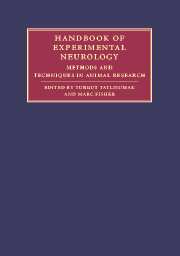Book contents
- Frontmatter
- Contents
- List of contributors
- Part I Principles and general methods
- 1 Introduction: Animal modeling – a precious tool for developing remedies to neurological diseases
- 2 Ethical issues, welfare laws, and regulations
- 3 Housing, feeding, and maintenance of rodents
- 4 Identification of individual animals
- 5 Analgesia, anesthesia, and postoperative care in laboratory animals
- 6 Euthanasia in small animals
- 7 Various surgical procedures in rodents
- 8 Genetically engineered animals
- 9 Imaging in experimental neurology
- 10 Safety in animal facilities
- 11 Behavioral testing in small-animal models: ischemic stroke
- 12 Methods for analyzing brain tissue
- 13 Targeting molecular constructs of cellular function and injury through in vitro and in vivo experimental models
- 14 Neuroimmunology and immune-related neuropathologies
- 15 Animal models of sex differences in non-reproductive brain functions
- 16 The ependymal route for central nervous system gene therapy
- 17 Neural transplantation
- Part II Experimental models of major neurological diseases
- Index
- References
11 - Behavioral testing in small-animal models: ischemic stroke
Published online by Cambridge University Press: 04 November 2009
- Frontmatter
- Contents
- List of contributors
- Part I Principles and general methods
- 1 Introduction: Animal modeling – a precious tool for developing remedies to neurological diseases
- 2 Ethical issues, welfare laws, and regulations
- 3 Housing, feeding, and maintenance of rodents
- 4 Identification of individual animals
- 5 Analgesia, anesthesia, and postoperative care in laboratory animals
- 6 Euthanasia in small animals
- 7 Various surgical procedures in rodents
- 8 Genetically engineered animals
- 9 Imaging in experimental neurology
- 10 Safety in animal facilities
- 11 Behavioral testing in small-animal models: ischemic stroke
- 12 Methods for analyzing brain tissue
- 13 Targeting molecular constructs of cellular function and injury through in vitro and in vivo experimental models
- 14 Neuroimmunology and immune-related neuropathologies
- 15 Animal models of sex differences in non-reproductive brain functions
- 16 The ependymal route for central nervous system gene therapy
- 17 Neural transplantation
- Part II Experimental models of major neurological diseases
- Index
- References
Summary
The ultimate validation of any animal model of human disease is the extent to which it simulates the parameter of interest. Depending on its purpose, the model may attempt to mimic the pathology and/or pathophysiology of a disease process, or predict the impact of putative therapeutic interventions. In the case of neurological disease, the ultimate outcome is behavioral. For example, in humans, the outcome of interest for patients with movement disorders is the preservation or return of normal motoric function, for persons afflicted with Alzheimer's disease it is the maintenance or restoration of normal cognition and for those with stroke or traumatic brain injury it is the return to their premorbid functional status. Although the fundamental features of simple stimulus–response relationships and even more complex environmental–behavioral interactions are remarkably preserved across species, the complete repertoire of human behaviors and their response to neurological disease are uniquely complex. Therefore, animal models will always be found to be wanting. Despite this fundamental limitation, animal behavior can provide critical insights into the functional consequences of human neurological disease and the potential benefit and toxicity of therapeutic interventions. They are particularly important as functional outcomes may be dissociated from the extent of neurological injury due to differences in the post-injury recovery process.
Limitations and principles
The limitations of small-animal behavioral models become apparent when considering the differences in even seemingly simple functional abilities as compared to humans.
Information
- Type
- Chapter
- Information
- Handbook of Experimental NeurologyMethods and Techniques in Animal Research, pp. 154 - 172Publisher: Cambridge University PressPrint publication year: 2006
References
Accessibility standard: Unknown
- 1
- Cited by
